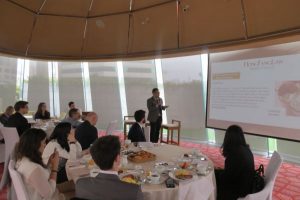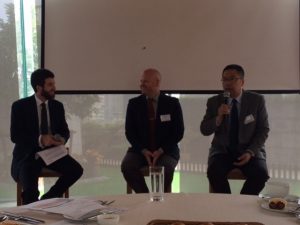How to protect your Brand from Copycats
Thanks to the support of the Australian Chamber of Commerce in Shanghai, HongFangLaw had the opportunity to present an insight on the Chinese IPR system and some case studies to corroborate the theory.

The event took place at Andaz hotel in Shanghai on November 15th. Mr. Andrew Kuiler and our partner Mr. Zhang Xu were invited to talk about the copycat industry in China and how to protect brands from imitation.
First Speaker: Zhang Xu

The conference started with the speech of our partner Zhang Xu who talked about trade dress: the combination of distinctive elements of a brand, which make it different from the others. There are different particulars that can evoke a brand: colors, design, shape, the font of the logo, etc.
Unfortunately, in China it is extremely common to find fake products similar to those from famous brands known worldwide. Trade dress cannot be registered, recorded, or patented in China, but there are various remedies to take when dispute happens.
Despite the evolution in the China Legal and Brand Management space and the new laws, which support brand protection, it is still easy for copycats to reproduce some elements that can confuse clients and drive them to buy something that is not what they would like to purchase.
In support of his speech, Zhangh Xu showed some case studies:
- The case of Castrol Ltd., which sued a Chinese lubricant company for trademark infringement and unfair competition to local court in Zhejiang Province; where the design of the container and overall image of the brand was too similar to the original to be discerned by an unprepared customer.
- The famous case of Ferrero Roches against Chinese Tresor Dore for unfair competition to court; where packaging and design of the product were too similar.
- Victoria’s Secret, which sued a Chinese company and retailer for trademark infringement and unfair competition in Shanghai City, China. Where the infringer again copied the store layout.
Second speaker: Andrew Kuiler

The founder of The Silk Initiative, a brand and insight strategy agency based in Shanghai specializing in the food and beverage sector, shared an insight into how Chinese consumers respond to knockoff products.
Andrew showed some cases of stolen brand, both based on the evocation of some international famous brands. In this examples Andrew showed how producers put tricky logos or claims on their products in order fool the buyers.
One of these cases is the one of a famous Danish biscuits brand, Kjeldsens copied by an Indonesian brand, Danisa. The two products are extremely similar due to the presence of the same claims on the package and very similar design.
He also detailed the cases of the American snack brand Goldfish and the one of Land Rover cars, which both have Chinese brands using their trade dress.
Andrew and his team decided to make a research in order to understand how people feel about fake products. What they discovered is that consumers do not really care about the original products; they only care about quality, price, promotions and the utility of what they buy.
For this reason, brands should care less of what other brands and competitors do and focus more on the creation of their own strong brand image trough:
- The knowledge of what the other competitors stand for and how they tell their story;
- Determining where the strongest point of difference is and what claims they can put a stake in the ground on:
- Being consistent across your whole marketing mix: proposition, product, pack, price, place, promotion and also being single-minded in the communication at all times;
- Land the hero occasion and primary and secondary target markets and focus the resource spent on those, communicating very clearly to the customers;
- Avoid wasting resources exploiting competitor’s weaknesses. Instead, it is important to make their strength either less important or less interesting by showing that you have something better to offer, which results in their strengths being less relevant in the future.

At the end of the speeches, the attendant had the opportunity to ask some question to Andrew and Zhang about the Chinese legislation, the importance of offline and online protection, and what are the first steps in?approaching the change of the Brand image.

If you would like some more personalized review of the event from us, please kindly let us know by writing to: public.relation@hongfanglaw.com. Thank you.
